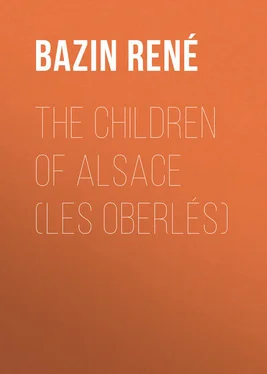René Bazin - The Children of Alsace (Les Oberlés)
Здесь есть возможность читать онлайн «René Bazin - The Children of Alsace (Les Oberlés)» — ознакомительный отрывок электронной книги совершенно бесплатно, а после прочтения отрывка купить полную версию. В некоторых случаях можно слушать аудио, скачать через торрент в формате fb2 и присутствует краткое содержание. ISBN: , Жанр: foreign_language, foreign_antique, foreign_prose, на английском языке. Описание произведения, (предисловие) а так же отзывы посетителей доступны на портале библиотеки ЛибКат.
- Название:The Children of Alsace (Les Oberlés)
- Автор:
- Жанр:
- Год:неизвестен
- ISBN:http://www.gutenberg.org/ebooks/34957
- Рейтинг книги:5 / 5. Голосов: 1
-
Избранное:Добавить в избранное
- Отзывы:
-
Ваша оценка:
- 100
- 1
- 2
- 3
- 4
- 5
The Children of Alsace (Les Oberlés): краткое содержание, описание и аннотация
Предлагаем к чтению аннотацию, описание, краткое содержание или предисловие (зависит от того, что написал сам автор книги «The Children of Alsace (Les Oberlés)»). Если вы не нашли необходимую информацию о книге — напишите в комментариях, мы постараемся отыскать её.
The Children of Alsace (Les Oberlés) — читать онлайн ознакомительный отрывок
Ниже представлен текст книги, разбитый по страницам. Система сохранения места последней прочитанной страницы, позволяет с удобством читать онлайн бесплатно книгу «The Children of Alsace (Les Oberlés)», без необходимости каждый раз заново искать на чём Вы остановились. Поставьте закладку, и сможете в любой момент перейти на страницу, на которой закончили чтение.
Интервал:
Закладка:
The four usual table companions Jean was going to meet there hardly corresponded to this joyous picture, and there was no harmony between them and the decorations of the room. They invariably sat in the same places, round the square table, according to the established order of deep affinities and antipathies.
The first to the left of the window, the nearest to the glass, which shed on her the reflection of its levelled edges, was Madame Monica Oberlé, tall and slender, with a face that had been rounded and fresh, but was now pale, lined, and thin. She gave the impression of a being accustomed only to hear around her the words "You are wrong." Her short-sighted eyes, very gentle, glanced at the guests who were introduced to her with a smile always ready to withdraw and fade away. They only paused after they had looked about for a little time, when nothing had repulsed or misunderstood them. Then they revealed a clear intelligence, a very kind heart, become a little shy and sad, but still capable of illusions and outbursts of youth. No one could have had a more careless youth, nor one that seemed a less fitting preparation for the part she had to play later. She was then called Monica Biehler, of the ancient family Biehler of Obernai. From the top of her father's house, whose fortified gable-end rises on the ramparts of the little town, she saw the immense plain all round her. The garden full of trimmed box and pear-trees, and hawthorn, where she played, was only separated by an iron railing from the public promenade built on the old wall, so that the vision of Alsace was printed each day on this child's soul, and at the same time love of her country, so happy then – love of its beauty, its peace, and its liberty, of its villages, whose names she knew, whose rosy bunches of grapes she could have pointed out among the harvest fields. Monica Biehler knew nothing else. She only left Obernai to go with all the family to spend two summer months in the lodge at Heidenbruch, in the Forest of Sainte Odile. Only once did she happen to cross the Vosges, the year before her wedding, to make a pilgrimage to Domrémy in Lorraine. Those had been three days full of enthusiasm. Madame Oberlé remembered those three days as the purest joy of her life. She would say: "My journey in France." She had remained simple; she had kept, in her very retired life at Alsheim, the easy fears, but also the sincerity – the secret boldness of her youthful affection for the country and for the country people. She had therefore suffered more than another would have done in her place, in seeing her husband draw near to the German party in Alsace, and finally join it. She had suffered in her Alsatian pride, and still more in her maternal love. For the same cause which separated her morally from her husband, her children were taken from her. The lines on her face, faded before its time, could each have borne a name, that of the grief which had scored them there: the line of despised goodness, the line of useless warnings, the line of her insulted country, of separation from Jean and Lucienne, of the uselessness of the treasure of love she had stored up for them during her single and married life.
Her bitterness had been the greater because Madame Oberlé had no illusions as to the true motives which guided her husband. And this he had divined. He was humiliated by this witness whom he could not deceive, and whom he could not help esteeming. She personified for him the cause which he had abandoned. It was to her he spoke when he felt the need of justifying himself, and he did so whenever he had the chance. It was against her that his anger rose, against her mute disapproval. Never once in twenty years had he been able to get her to agree – not by one word – that Alsace was German. This timid woman yielded to force but she did not approve of it. She followed her husband into German society; there she bore herself with such dignity that one could neither deceive oneself as to her attitude, nor bear a grudge against her for it. There she safeguarded more than appearances. A mother, separated from her children, she had not separated herself from her husband. They still used the twin-bedsteads in the same room. They had continual scenes, sometimes on one side, sometimes acrimonious and violent on both sides. Nevertheless Madame Oberlé understood that her husband only hated her clear-sightedness and judgment. She hoped she would not always be in the wrong. Now that the children were grown up she believed that some very important decisions would have to be made with regard to them, and that by her long patience and by her numerous concessions she had perhaps gained the right to speak then and be heard.
Near her, and at her right, the grandfather, M. Philippe Oberlé, had always sat. For some years, five minutes before the time of the meal the dining-room door would open, the old man would come in, leaning on the arm of his valet, trying to walk straight, clothed in an anomalous garment of dark wool, his red ribbon in his button-hole, his head weary and bent, his eyelids nearly closed, his face swollen and bloodless. They placed him in a large chair with arms upholstered in grey; they tied his table napkin round his neck, and he waited, his body leaning against the chair-back, his hands on the table – hands pale as wax, in which the knotted blue veins were distinctly visible. When the others arrived M. Joseph Oberlé shook him by the hand; Lucienne threw him a kiss and a number of words audibly spoken in her fresh young voice; Madame Oberlé bent down and pressed her faithful lips on the old man's forehead. He thanked her by watching her sit down. He did not look at the others. Then he made the sign of the cross, she and he alone, being a son of that old Alsace which still prayed. And served by this neighbour so silently charitable, who knew all his tastes, his shame of a certain clumsiness, and who forestalled his wishes, he began to eat, slowly, with difficulty moving his relaxed muscles. His dreamy head remained leaning against the chair. His head alone was watching in a body nearly destroyed. It was the theatre where, for the pleasure and pain of one alone, there passed before his mental vision the forebears of those whose names were mentioned before him. He did not speak, but he remembered. Sometimes he drew from his pocket a schoolboy's slate and pencil, and he wrote, with an uncertain writing, two or three words, which he made his neighbour read; some rectification, some forgotten date, his approval or disapproval to join in with the words just spoken on the other side of the table. Generally they knew when he was interested by the movement of his heavy eyelids. It was only for a moment. Life sank again to the depth of the prison whose bars she had tried to shake. Night closed in once more round those thoughts of his, unable to make themselves intelligible. And in spite of being accustomed to it, the sight of this suffering and of this ruin weighed on each of the members of the assembled family. It was less painful to strangers who sat for one evening at the Alsheim table, for the grandfather on those days did not try to break the circle of darkness and death which oppressed him. Until these last years M. Joseph Oberlé had always continued to present his guests to his father, up to the day when he wrote on his slate: "Do not present any one to me, above all, no Germans. Let them acknowledge my presence: that will be enough." The son had kept the habit – and it was a touching thought on the part of this selfish man – to give every evening an account of the business of the factory to the old chief. After dinner, smoking in the dining-room, while the two women went into the drawing-room, he told him all about the day's mail, the consignments, and the purchases of wood. Although M. Philippe Oberlé was now only the sleeping partner of the business he had founded, he was under the illusion that he was advising and directing still. He heard talk of the maples, pines and firs, oaks and beeches among which he had breathed for fifty years. He thought much of the "conference," as he called it, as the only moment in the day in which he appeared himself, to himself, and as some one of importance in the lives of others. Except for that he was only a shadow, a dumb soul present, who judged his house, but rarely gave voice to his decision.
Читать дальшеИнтервал:
Закладка:
Похожие книги на «The Children of Alsace (Les Oberlés)»
Представляем Вашему вниманию похожие книги на «The Children of Alsace (Les Oberlés)» списком для выбора. Мы отобрали схожую по названию и смыслу литературу в надежде предоставить читателям больше вариантов отыскать новые, интересные, ещё непрочитанные произведения.
Обсуждение, отзывы о книге «The Children of Alsace (Les Oberlés)» и просто собственные мнения читателей. Оставьте ваши комментарии, напишите, что Вы думаете о произведении, его смысле или главных героях. Укажите что конкретно понравилось, а что нет, и почему Вы так считаете.












